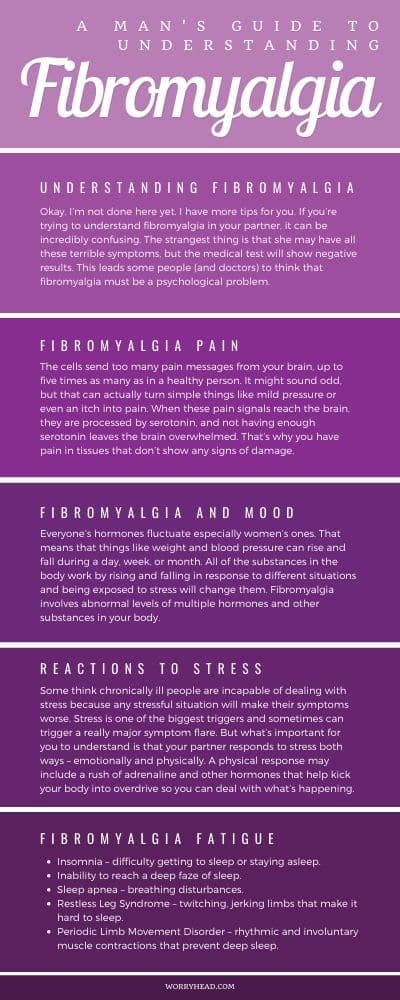A Man’s Guide to Understanding Fibromyalgia
It is my husbandry point of view on one of my wife’s chronic illnesses, and it is a man’s guide to understanding fibromyalgia. I want to share with you my manly perspective because those are rare, yet very important to see our (blokes) point of view…
Fibromyalgia, a chronic pain disorder, affects men and women, although it is more commonly diagnosed in women. Men with fibromyalgia may experience similar symptoms, including widespread pain, fatigue, and sleep disturbances. Understanding fibromyalgia as a man involves recognizing its symptoms, seeking a medical diagnosis, and exploring treatment options to manage the condition and improve overall quality of life.
As I stand by my wife’s side, watching her battle with fibromyalgia, my heart swells with love and admiration. She is my soulmate, and my partner in life, and I would do anything to support her through this difficult journey.
From the moment she was diagnosed, our lives were forever changed. Fibromyalgia added to her primary condition – stage 4 endometriosis, and the medical appointments, the medications, the constant pain – it’s all taken its toll on both of us.
But no matter what challenges we face, I am committed to staying by her side every step of the way.
I know that our relationship has been tested in ways we never could have imagined. We’ve had to adjust to a new normal, with new roles and responsibilities. But through it all, our love for each other has only grown stronger.
There are moments of fear and uncertainty, but I am always there to provide comfort and reassurance. I hold her hand through doctor’s appointments, and I listen to her vent about the frustrations of living with chronic pain. I know that I can’t cure her illness, but I can be a source of strength and support.
Through this journey, I’ve learned that true love means being there for each other in sickness and in health. No matter what the future holds, I am grateful to have my wife by my side, and I am honored to stand beside her as we face this challenge together.
I found tremendous help in finding my way through the new normal thanks to a wonderful book that I cannot recommend enough – it truly saved my marriage!
A man’s guide to fibromyalgia.
Understanding fibromyalgia and fibromyalgia symptoms can be difficult if you don’t suffer from it yourself or have a piece of medical knowledge. Fibromyalgia affects the central nervous system.
It’s a complex condition that involves your nervous system and can have an impact on every part of your body. Symptoms can come and go, and their strength may vary.
Fibromyalgia is a chronic condition marked by widespread pain, chronic fatigue, sleep issues, and cognitive problems.
Fibromyalgia affects mostly women rather than most men, about 80 percent of most people suffering from it are women.
This is a man’s guide to understanding fibromyalgia symptoms, not only because little to 20 percent of men suffer from it, my wife battles fibromyalgia and endometriosis daily.
It is meant to be dedicated to all the husbands whose wives suffer from fibro, however, most men will benefit from reading this post because fibromyalgia diagnosis can be difficult if you don’t know what to look for.

Understanding fibromyalgia…
My wife, M, developed fibromyalgia after her diagnosis of deep infiltrating endometriosis.
You see, gentlemen, any chronic condition originates from childhood trauma. If you would like proof of that, I’d invite you to read a book by dr Gabor Maté.
“When the Body Says No the cost of hidden stress”, explores the role of the mind-body link between childhood trauma and chronic conditions and diseases.
It’s not always easy to be a husband to someone living with multimorbidity, but we have worked hard with M to manage her chronic conditions and that includes fibromyalgia.
We have learned how to have a solid relationship through the years since 2008.
My lessons learned can help other partners of people with fibromyalgia cope with the daily challenges of chronic pain and the mental impact it has on the spousal caregiver.
Many men are in need of education about the condition, and many men need advice in coping with their partner’s illness so those who suffer can live a better quality of life.
Fibromyalgia diagnosis is hard to digest, and amongst married couples has a higher divorce rate due to many factors that impact both of them, including:
- Pain
- Sex
- Mood
- Work
- Finances
- Social life

Get educated!
So, how such a man’s guide to understanding fibromyalgia can help you?
Well, for one – you’re here. This means you have an open mind and want to learn about your partner’s chronic pain condition.
Secondly, it means that you care for your loved one and that my friend will help tremendously!
Let’s start with the basics:
Understand that it’s a real disease.
Firstly, men need to understand that fibromyalgia symptoms seem like an invisible illness, but fibro it’s a real disease of which widespread pain is the most common symptom.
One of the biggest problems with a chronic pain condition like fibromyalgia is that many people still don’t believe it exists.
This is one of the biggest reasons why women are diagnosed after many years of silent suffering.
Not being able to see what is wrong with your wife or partner can make any chronic condition difficult to accept. Pain is invisible.
That’s why trust and an open mind are important!
For any relationship to work, there has to be trust. Even a “healthy marriage” can fall apart without trust and communication, let alone one with a chronic condition.
Get educated.
One thing that can help you better understand fibromyalgia and fibromyalgia symptoms, is to read about the disease so you will know what your partner might be going through.
I say “might be” for a reason! You are NOT in your wife’s/partner position. You will never experience what they feel.
One of the best things I can suggest to you that helps in understanding fibromyalgia is what I did, and still, do to this day.
Because we never stop learning…
The best way to understand what your loved one is going through is in front of you – it’s your partner!
Ask her how she feels. There are so many aspects of the impact of fibromyalgia symptoms on her.
This chronic pain condition not only will affect her emotionally, mentally, psychologically, and physically, it will affect you too my friend!
Your partner is your best source of information!
Doctors and drugs!
Fibromyalgia and drugs.
Treatment improved a lot in recent years. There are drugs that can be prescribed for fibromyalgia symptoms, however…
Myself and M, we’re not big fans of drugs, besides, they never suited my wife. I’m talking about hormones and painkillers for pain control, the whole shebang! The best way she tackles her widespread pain is by using CBD products.
So please take our opinion with a pinch of salt.
You see, you cannot treat chronic pain with an acute mindset.
Scientifically speaking, drugs don’t work in the long run for chronic illness. Don’t get me wrong, drugs are fantastic, but they are fantastic for trauma pain, such as acute ones.
Medications can be a powerful tool but they come with plenty of side effects, therefore are perfect for acute pain because it doesn’t require long-term medication.
In the case of chronic pain, it’s a different situation because there is no ending point to pain and meds need to be used with caution!
People develop tolerance to pain wanting to increase the dosage every so often.
That’s dangerous because you need more and more drugs to get the same effect. It may lead you to addiction.
The problem is that when we develop tolerance to drugs, every time we increase the dosage, we increase the side effects.
Side effects affect you not only physically but also mentally.
So, be aware that medication in a long run becomes costly and more problematic than helpful.
Since you are interested in fibromyalgia, I wrote a “Fibromyalgia for Caring Partners” e-Book, in which 1st chapter is absolutely FREE! You are going to learn about fibromyalgia symptoms and how to take care of her.
FREE Fibromyalgia e-Book
Fibromyalgia for Caring Men

Have an open mind!
Have an open mind!
Be flexible with fibromyalgia because your plans can change, events can get canceled, and sometimes you may find yourself housebound when you had an important task to do.
You shouldn’t blame your partner for it, she has enough on her plate and feels like a burden to you, besides, it is not her fault she’s ill!
By being spontaneous, keeping your plans flexible, and going with the flow, it will make your life easier.
You will definitely find that “friends” will disappear. But there is one thing that we’ve learned – you’ll find out who your true friends are!
If they are your true friends, they’ll understand what we’re going through and stick around. Otherwise, don’t waste your precious time.
Expect bad days. They’ll come. There will be plenty of those…
Not only you’ll get disappointed socially, but you may find that even some of your family members won’t understand what both of you are going through. Be prepared, and don’t judge, it’s not their fault…

Mental impact!
Psychological and mental impact!
Fibromyalgia symptoms vary. It affects the nervous system but also mental health. Anxiety, depression, and other mood changes related to bad days will be common when your loved one has a fibromyalgia flare-up.
You need to (and you will) develop a mindset that allows you to accept such bad days. But you’ll have good days too! So patience is key here. Help your loved one cope with the bad days in any way you can.
Mainly her mood will be impacted by pain. You should expect her to feel the following:
- Deep pain.
- Chronic pain.
- Aching pain.
- Whole-body pain.
- Radiating pain.
- Tender pain.
- Shooting pain.
- Stabbing pain.
- Jaw pain.
- Tingling, itching.
- Sensitive skin.
- Sensitivity to hot and cold.
- Sleep issues.
- Chronic fatigue.
- Forgetfulness is called “fibro fog” or “brain fog”.
- Restless Leg Syndrome.
- Irritable Bowel Syndrome.
- Migraines, etc…
General anxiety and depression are very common fibromyalgia symptoms, and you should expect them both.
But your partner may also develop Obsessive-Compulsive Disorder. My wife did.
In some cases (also my wife’s) your partner’s anxiety may turn into panic disorder. Depression, on the other hand, may lead your loved one to negative thoughts and suicidal attempts.
Be prepared to take her to A&E, and be close. Don’t try to reassure her, she won’t be able to take it well, her mind will be set on negative thoughts and only time will be the solution.
Simply, be there for your partner, and don’t let go until she reaches a hospital.
Find support!
Find a support network.
Even the most understanding of husbands is going to need their own support network of friends, family, and professional clinicians who can help with what they are going through.
I am fortunate to be an optimist and things don’t break me easy. I also can speak quite openly to my mother-in-law about the issues I am facing, and she is really helpful.
You may also find endless supportive people in Facebook and Twitter support groups. Reach out! They are friendly and really supportive.
Saying that a man’s guide to understanding fibromyalgia symptoms and the disorder itself doesn’t require only seeking support and taking care of your partner… You must try and be independent!
Self-care matters and should be your priority!
So…
Be independent!
It’s very important to have your own interests and activities so that you are not always focused on the world of fibromyalgia. If you continue to focus only on her, you will reach caregiver burnout!
I am an extremely active gym-goer, and my wife and I love Latin-Ballroom dancing.
These things (especially during the Covid-19 lockdown) may not always be possible. They weren’t when my wife felt suicidal.
I took two months of work to be by her side. She needed me, I felt most reassured being there and less worried. I felt in control… but I had nothing to do. Bummer!
Life can kick you up the ass, but life can also turn things better. I’m a believer that every “depression”, downside, whatever we call it, has an opportunity. Even the darkest moments of our lives turned into something positive – I was born then as a blogger!
I blog and help people. Besides, done right, it brings financial freedom!
Since my man’s guide to understanding fibromyalgia isn’t the topic of blogging, I suggest you check out my blogging posts.
So, be very supportive of your partner, but continue these activities that you love the most.

Sex and intimacy.
Be patient about intimacy.
Aversion to touch and low sex drive are very common fibromyalgia symptoms, and they quite naturally can be frustrating not only to your partner but to you too.
My wife has endometriosis. Endometriosis alone ( even without her irritable bowel syndrome) impacted our sexual life and the opportunity to have kids. Adding to it fibromyalgia symptoms made it for my wife almost unbearable to live such a life.
Additionally, she felt guilty for me not being able to experience these wonderful moments, all that was one of many causes for her feeling like a burden.
But we found ways around it. I cannot tell you the details, but I can tell you this gents – sexy time isn’t only about penetration.
Work together to find out what kinds of touch feel good and what hurts. Fibromyalgia doesn’t mean you will never have intimate moments again.
If I and my wife managed to do it with two chronic illnesses trying to ruin our intimacy, you can! Maintaining intimacy is vital to your relationship, but you may need to be patient my friend. To do that, you need to communicate.
Communication.
Communicate.
The key to staying together as a couple is keeping the lines of communication open so encourage your partner to let you know how she is feeling, and you need to express your own feelings too.
Too many couples keep their feeling inside of them. We are human, we aren’t unbreakable.
The lack of communication is the most common reason for divorce and broken marriages.
By doing so, you’ll have a much better chance of keeping your relationship healthy despite the challenges fibromyalgia can bring, such as loss of trust and depression in marriage.
FREE Fibromyalgia e-Book
Fibromyalgia for Caring Men

Spousal caregiver…
Caregiving for a chronically ill spouse.
You, as the caregiver, will have to be clever in finding ways of what to say and what not to say, and when.
Don’t neglect your needs. Do more of what makes you happy!
A fantastic partner like yourself may be really affected by the caregiving experience, but remember that you can both seek therapies that you can attend together.
I’m talking about CBT – Cognitive-Behavioural therapy for couples.
Ideally, it should be with someone who is chronic illness orientated. Out of three CBT sessions my wife had, only one of them was with a chronic illness therapist.
Private CBT can be pricey. Free CBT provided by NHS is good but you have to wait for it in a long queue.
My wife waited nine months for her first session, 6 months for the second, and three for the last one.
Meanwhile, I had to support her through moody ups and downs. It was hard, it took a long time.

Understanding fibromyalgia further!
Okay, I’m not done here yet. I have more tips for you.
If you’re trying to understand fibromyalgia in your partner, it can be incredibly confusing.
The strangest thing is that she may have all these terrible symptoms, but the medical test will show negative results.
This leads some people (and doctors) to think that fibromyalgia must be a psychological problem.
- When someone’s in pain, there should be an obvious cause, right?
- How does pain jump from one area of the body to another?
- Why does a light touch hurt like you’ve been hit or burned?
There is plenty of scientific evidence, however, it suggests that it’s a very real physical condition.
Going through that scientific research doesn’t help your partner but it helps you understand how to support her better.
Understanding fibromyalgia pain.
Fibromyalgia pain:
The cells send too many pain messages from your brain, up to five times as many as in a healthy person.
It might sound odd, but that can actually turn simple things like mild pressure or even an itch into pain.
When these pain signals reach the brain, they are processed by serotonin, and not having enough serotonin leaves the brain overwhelmed.
That’s why you have pain in tissues that don’t show any signs of damage.
Fibromyalgia pain is not imagined. It’s simply a misinterpreted sensation that the nerves and brain turn into actual pain because when your brain says something hurts, it hurts.
Additionally, there are other substances in the brain that can amplify a lot of other signals. This means that your pain may be “turning up the volume” even further.
All these painful signals can cause confusion, fear, anxiety, and even panic attacks.

Understanding the mood.
Understanding the mood:
Most people with chronic illnesses are always sick. Your partner seems to constantly feel bad because she is most of the time.
The effects on the body of fibromyalgia don’t seem to go away. It’s confusing to your spouse.
Sometimes the pain may be unbearable on Monday, and no pain at all on Tuesday.
Everyone’s hormones fluctuate especially women’s. That means that things like weight and blood pressure can rise and fall during a day, week, or month.
All of the substances in the bodywork rising and falling in response to different situations and being exposed to stress will change them.
Fibromyalgia involves abnormal levels of multiple hormones and other substances in your body.
Because all of the substances and hormones go up and down, some of them are in the normal zone and other times they’re not.
When more of them are out of the zone, the worse the person feels.
Understanding reactions to stress.
Some think chronically ill people are incapable of dealing with stress because any stressful situation will make their symptoms worse.
Unfortunately, stress is one of the biggest triggers and sometimes can trigger a really major symptom flare.
But what’s important for you to understand is that your partner responds to stress both ways – emotionally and physically.
A physical response may include a rush of adrenaline and other hormones that help kick your body into overdrive so you can deal with what’s happening.
My wife literally gets a rash on her cheeks, and sometimes on her stomach and back when feeling extremely stressed.
Usually when talking about “stress”, we mean the emotional kind, which can come from your job, financial problems, or any kind of conflict.
In reality, a lot of things actually cause physical stress, such as illness, lack of sleep, nutritional deficiencies, and injuries.
To look at it in the detail, I would strongly advise you to read the book “When the Body Says No – The Cost of Hidden Stress” by dr Gabor Maté. He explains the concept of illness originated from childhood trauma.
Think of waking up from a frightening dream in the middle of the night when you’re in a deep sleep.
Now, imagine that you have a scary dream every time you close your eyes, almost every night.
My wife barely sleeps, because every time she wakes up, any sudden movement may cause her pain to come back.
That makes it harder for her to go back to sleep.
When she wakes up in the morning, she needs to get ready for work.
Being tired after a sleepless night, M feels foggy, slow, and drained of energy. In the evening she’s in pain, struggling to fall asleep.
Naturally, M begins to overthink and worry which turns into her having nightmares. The cycle continues…
That’s what my wife goes through most nights, and that’s just an example of what people with fibromyalgia go through.
Understanding fibromyalgia fatigue.
Think of a time when you felt really exhausted. I’m not talking just tired, but really drained of energy, you didn’t even feel like eating…
Maybe you were up all night studying for a test. Maybe you had to get up multiple times to feed a baby or take care of a sick child. Maybe it was the flu or Covid-19.
Imagine feeling like that all day and trying to work, take care of kids, clean, cook dinner, etc.
For most healthy people, one good night’s sleep would take care of that.
With fibromyalgia, however, having a good night’s sleep is rare. Your partner can have from one to all of the following sleep disorders:
- Insomnia – difficulty getting to sleep or staying asleep.
- Inability to reach a deep phase of sleep.
- Sleep apnea – breathing disturbances.
- Restless Leg Syndrome – twitching, jerking limbs that make it hard to sleep.
- Periodic Limb Movement Disorder – rhythmic and involuntary muscle contractions that prevent deep sleep.
Apart from that, most people with fibromyalgia no matter how much they sleep, don’t wake up rested. I wish there were some clinical trials for fibromyalgia because it’s difficult to prove fibromyalgia symptoms related to sleep problems.
Oftentimes, they are often kept awake or awakened by pain.

Summary of a Man’s Guide to Understanding Fibromyalgia.
I hope that my man’s guide to understanding fibromyalgia helped you understand a little bit about your partner’s condition.
If you have any questions, I’d happily answer. Simply meet me in the comments section below and let’s have a discussion.
Maybe you have something interesting to add, and maybe your loved one struggles in different ways.
Let’s share and spread awareness gentlemen about our struggles and coping mechanisms.
Tell me what you think. Cheerio!


About Me
Hi, I’m Lucjan! The reason why I decided to create this blog was my beautiful wife, who experienced a lot of pain in life, but also the lack of information about endometriosis and fibromyalgia for men…
